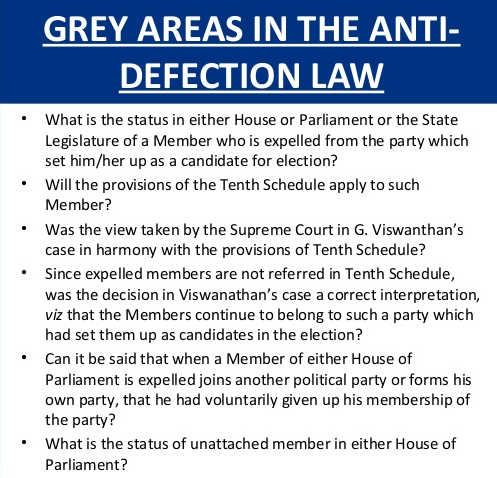From UPSC perspective, the following things are important :
Prelims level: anti-defection
Mains level: addressing the shortcomings in the Tenth Schedule

Central idea
The article explores the persistent challenges and loopholes in India’s anti-defection law, particularly focusing on the strategic exploitation of the Tenth Schedule. It highlights instances of group defections destabilizing democratically elected State governments and proposes urgent reforms, starting with the removal of the merger exception, to restore the efficacy of the anti-defection law and prevent its misuse. The complex scenarios in Maharashtra and historical trends underscore the need for a comprehensive legislative response to strengthen the democratic framework.
Key Highlights:
- Eternal Debate: The persistent nature of debates and discussions around political defections and India’s anti-defection law.
- Speaker’s Balancing Act: Maharashtra Assembly Speaker, Rahul Narwekar, navigating the Assembly’s winter session while handling Shiv Sena factions’ disqualification petitions.
Key Challenges:
- Tenth Schedule Critique: Identifying and addressing weaknesses in the Tenth Schedule, allowing for strategic and unpunished political defections.
- State Government Instability: Instances of defections leading to the collapse of democratically elected State governments in Maharashtra, Madhya Pradesh, Manipur, Karnataka, and Arunachal Pradesh.
Key Terms/Phrases:
- Tenth Schedule: Constitutional section housing the anti-defection law.
- Exemptions and Amendments: Two-thirds majority merger provision, 91st Amendment’s omission of the one-third split provision, splitting and merging trends.
- Disqualification Petitions: Filed before legislative Speakers under the Tenth Schedule.
Key Quotes/Anecdotes:
- Strategic Exploitation: Skillful use of exemptions under the Tenth Schedule causing democratically elected governments to crumble.
- Defection Strategies: Instances of splits followed by mergers, highlighting a pattern of exploiting the anti-defection law for political maneuvering.
Key Statements:
- Legislative Response: The removal of the one-third split provision in 2003 as a response to its frequent and strategic misuse.
- Limited Safeguard: The merger exception being the primary safeguard, prompting concerns about its efficacy in preventing group defections.
Key Examples and References:
- Maharashtra’s Complex Scenario: Shiv Sena and NCP factions claiming the status of the original party, forming alliances without actual mergers.
- Surveyed Instances: Instances from Uttar Pradesh and Haryana Assemblies illustrating splits followed by mergers and rapid succession defections.
Key Facts/Data:
- 91st Amendment Impact: Omission of the provision allowing exemption for one-third splits in the original party in 2003.
- Recent Instances: A decade marked by group defections leading to the destabilization of State governments.
Critical Analysis:
- Ailments in the Tenth Schedule: In-depth scrutiny of flaws in the anti-defection law, questioning its effectiveness and the need for reforms.
- Strategic Exploitation: Examining how merger provisions have been strategically used to undermine the stability of elected governments.
Way Forward:
- Deletion of Merger Exception: Urgent removal of the merger exception as a crucial step in addressing the shortcomings in the Tenth Schedule.
- Comprehensive Reforms: Advocating for comprehensive reforms post-deletion to fortify the anti-defection law and restore its intended efficacy.
Get an IAS/IPS ranker as your 1: 1 personal mentor for UPSC 2024
